Travel and Tourism Sector Report
VerifiedAdded on 2019/12/03
|13
|5116
|414
Report
AI Summary
This report provides a comprehensive analysis of the travel and tourism sector, focusing on London. It examines key historical developments, the sector's structure, the roles of government and international agencies, factors affecting demand and supply, and the positive and negative economic, environmental, and social impacts of tourism. The report also proposes strategies to minimize negative impacts while maximizing positive ones. The analysis covers various aspects, including the influence of economic and political changes on the sector's success, using examples from Iran and China. The report concludes by summarizing the findings and highlighting the importance of sustainable tourism practices.
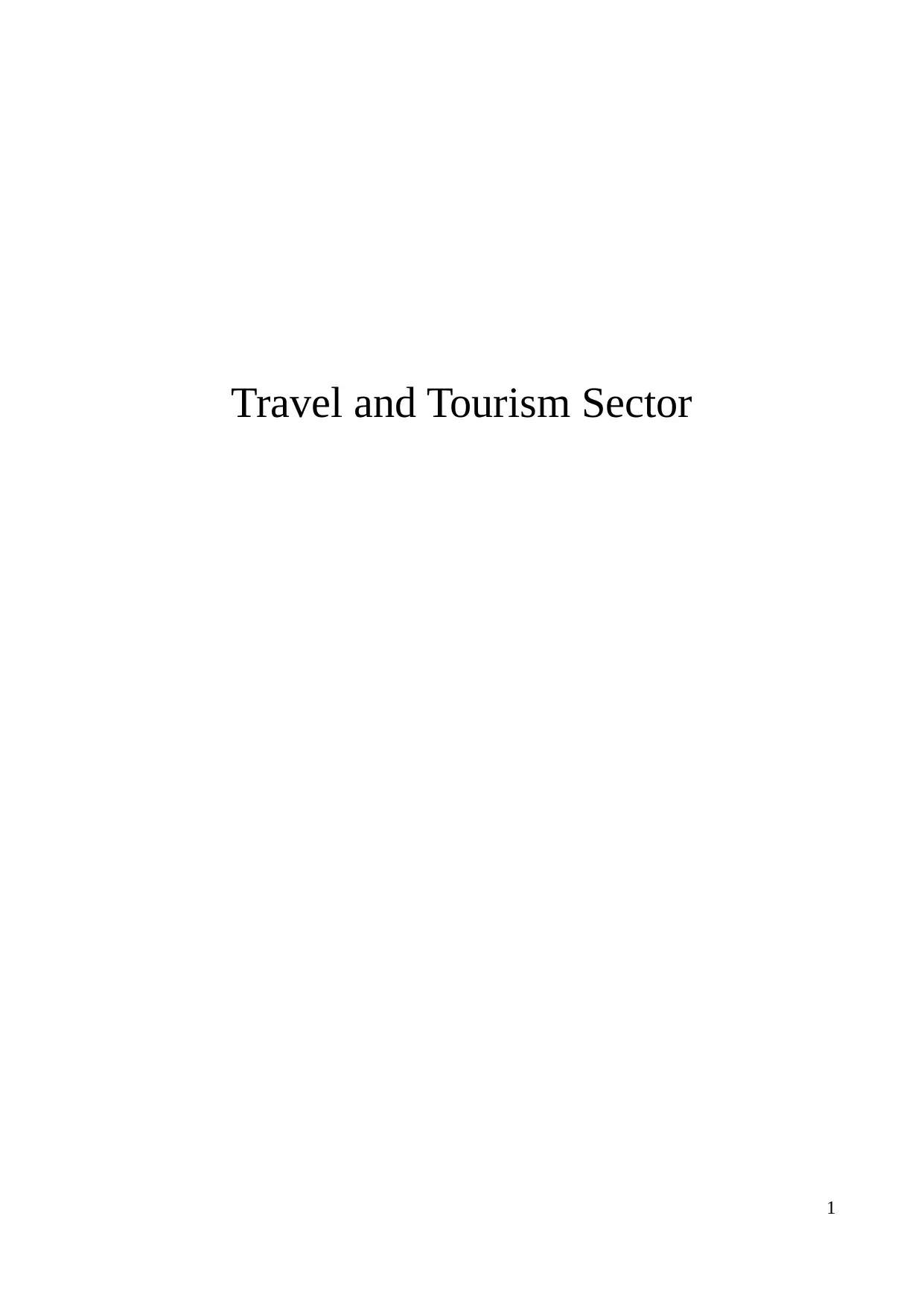
Travel and Tourism Sector
1
1
Paraphrase This Document
Need a fresh take? Get an instant paraphrase of this document with our AI Paraphraser
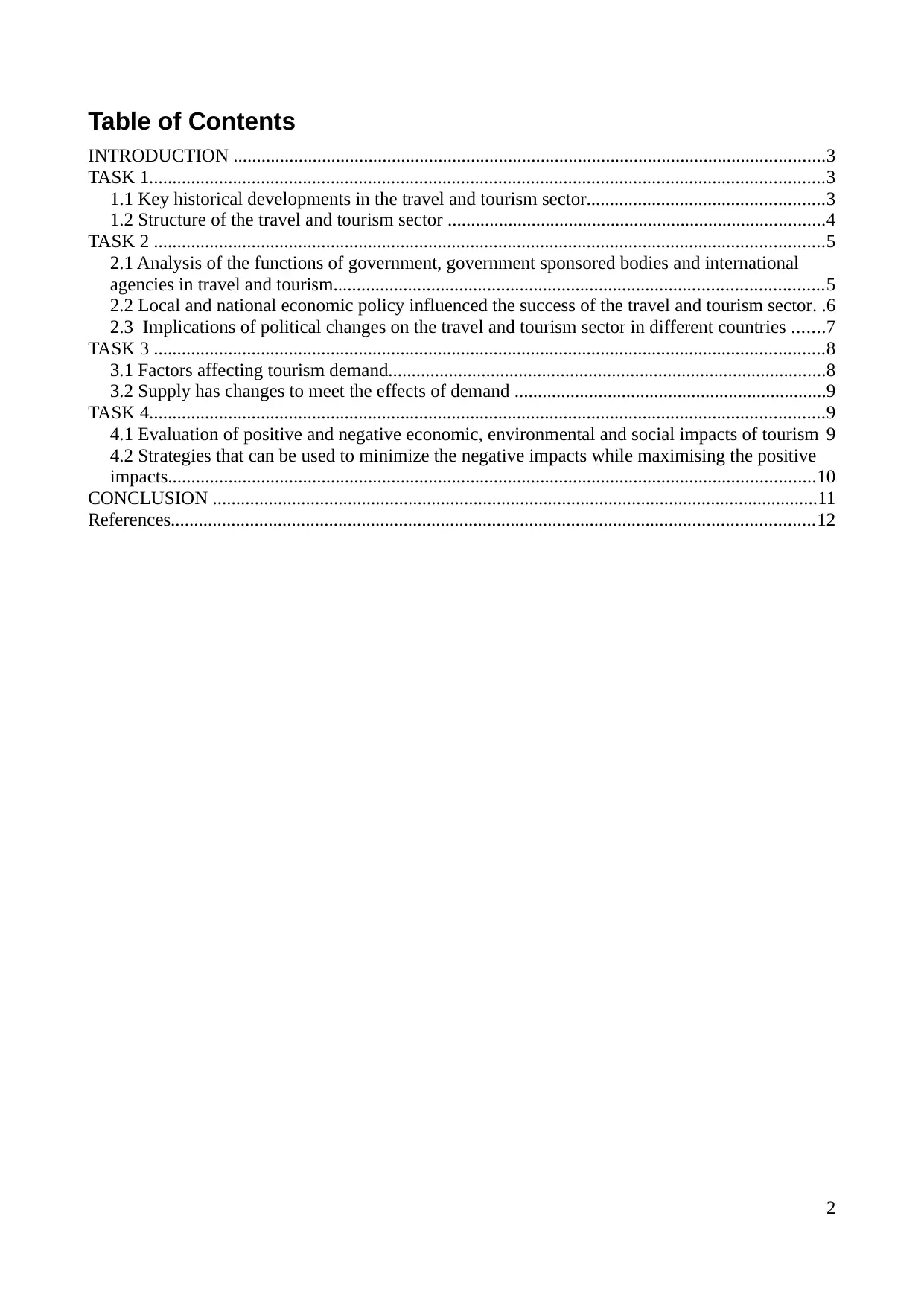
Table of Contents
INTRODUCTION ...............................................................................................................................3
TASK 1.................................................................................................................................................3
1.1 Key historical developments in the travel and tourism sector...................................................3
1.2 Structure of the travel and tourism sector .................................................................................4
TASK 2 ................................................................................................................................................5
2.1 Analysis of the functions of government, government sponsored bodies and international
agencies in travel and tourism.........................................................................................................5
2.2 Local and national economic policy influenced the success of the travel and tourism sector. .6
2.3 Implications of political changes on the travel and tourism sector in different countries .......7
TASK 3 ................................................................................................................................................8
3.1 Factors affecting tourism demand..............................................................................................8
3.2 Supply has changes to meet the effects of demand ...................................................................9
TASK 4.................................................................................................................................................9
4.1 Evaluation of positive and negative economic, environmental and social impacts of tourism 9
4.2 Strategies that can be used to minimize the negative impacts while maximising the positive
impacts...........................................................................................................................................10
CONCLUSION ..................................................................................................................................11
References..........................................................................................................................................12
2
INTRODUCTION ...............................................................................................................................3
TASK 1.................................................................................................................................................3
1.1 Key historical developments in the travel and tourism sector...................................................3
1.2 Structure of the travel and tourism sector .................................................................................4
TASK 2 ................................................................................................................................................5
2.1 Analysis of the functions of government, government sponsored bodies and international
agencies in travel and tourism.........................................................................................................5
2.2 Local and national economic policy influenced the success of the travel and tourism sector. .6
2.3 Implications of political changes on the travel and tourism sector in different countries .......7
TASK 3 ................................................................................................................................................8
3.1 Factors affecting tourism demand..............................................................................................8
3.2 Supply has changes to meet the effects of demand ...................................................................9
TASK 4.................................................................................................................................................9
4.1 Evaluation of positive and negative economic, environmental and social impacts of tourism 9
4.2 Strategies that can be used to minimize the negative impacts while maximising the positive
impacts...........................................................................................................................................10
CONCLUSION ..................................................................................................................................11
References..........................................................................................................................................12
2
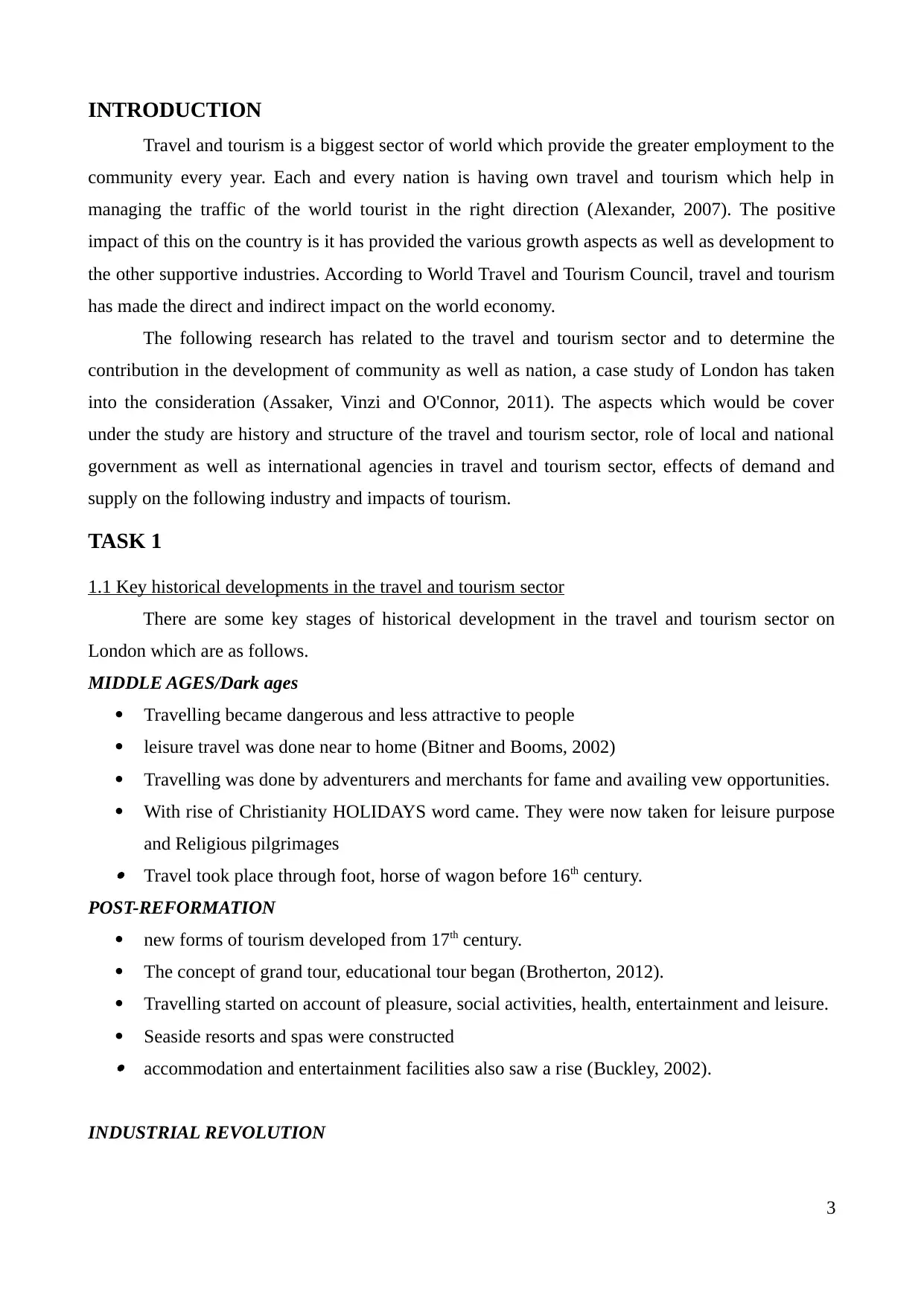
INTRODUCTION
Travel and tourism is a biggest sector of world which provide the greater employment to the
community every year. Each and every nation is having own travel and tourism which help in
managing the traffic of the world tourist in the right direction (Alexander, 2007). The positive
impact of this on the country is it has provided the various growth aspects as well as development to
the other supportive industries. According to World Travel and Tourism Council, travel and tourism
has made the direct and indirect impact on the world economy.
The following research has related to the travel and tourism sector and to determine the
contribution in the development of community as well as nation, a case study of London has taken
into the consideration (Assaker, Vinzi and O'Connor, 2011). The aspects which would be cover
under the study are history and structure of the travel and tourism sector, role of local and national
government as well as international agencies in travel and tourism sector, effects of demand and
supply on the following industry and impacts of tourism.
TASK 1
1.1 Key historical developments in the travel and tourism sector
There are some key stages of historical development in the travel and tourism sector on
London which are as follows.
MIDDLE AGES/Dark ages
Travelling became dangerous and less attractive to people
leisure travel was done near to home (Bitner and Booms, 2002)
Travelling was done by adventurers and merchants for fame and availing vew opportunities.
With rise of Christianity HOLIDAYS word came. They were now taken for leisure purpose
and Religious pilgrimages Travel took place through foot, horse of wagon before 16th century.
POST-REFORMATION
new forms of tourism developed from 17th century.
The concept of grand tour, educational tour began (Brotherton, 2012).
Travelling started on account of pleasure, social activities, health, entertainment and leisure.
Seaside resorts and spas were constructed accommodation and entertainment facilities also saw a rise (Buckley, 2002).
INDUSTRIAL REVOLUTION
3
Travel and tourism is a biggest sector of world which provide the greater employment to the
community every year. Each and every nation is having own travel and tourism which help in
managing the traffic of the world tourist in the right direction (Alexander, 2007). The positive
impact of this on the country is it has provided the various growth aspects as well as development to
the other supportive industries. According to World Travel and Tourism Council, travel and tourism
has made the direct and indirect impact on the world economy.
The following research has related to the travel and tourism sector and to determine the
contribution in the development of community as well as nation, a case study of London has taken
into the consideration (Assaker, Vinzi and O'Connor, 2011). The aspects which would be cover
under the study are history and structure of the travel and tourism sector, role of local and national
government as well as international agencies in travel and tourism sector, effects of demand and
supply on the following industry and impacts of tourism.
TASK 1
1.1 Key historical developments in the travel and tourism sector
There are some key stages of historical development in the travel and tourism sector on
London which are as follows.
MIDDLE AGES/Dark ages
Travelling became dangerous and less attractive to people
leisure travel was done near to home (Bitner and Booms, 2002)
Travelling was done by adventurers and merchants for fame and availing vew opportunities.
With rise of Christianity HOLIDAYS word came. They were now taken for leisure purpose
and Religious pilgrimages Travel took place through foot, horse of wagon before 16th century.
POST-REFORMATION
new forms of tourism developed from 17th century.
The concept of grand tour, educational tour began (Brotherton, 2012).
Travelling started on account of pleasure, social activities, health, entertainment and leisure.
Seaside resorts and spas were constructed accommodation and entertainment facilities also saw a rise (Buckley, 2002).
INDUSTRIAL REVOLUTION
3
⊘ This is a preview!⊘
Do you want full access?
Subscribe today to unlock all pages.

Trusted by 1+ million students worldwide
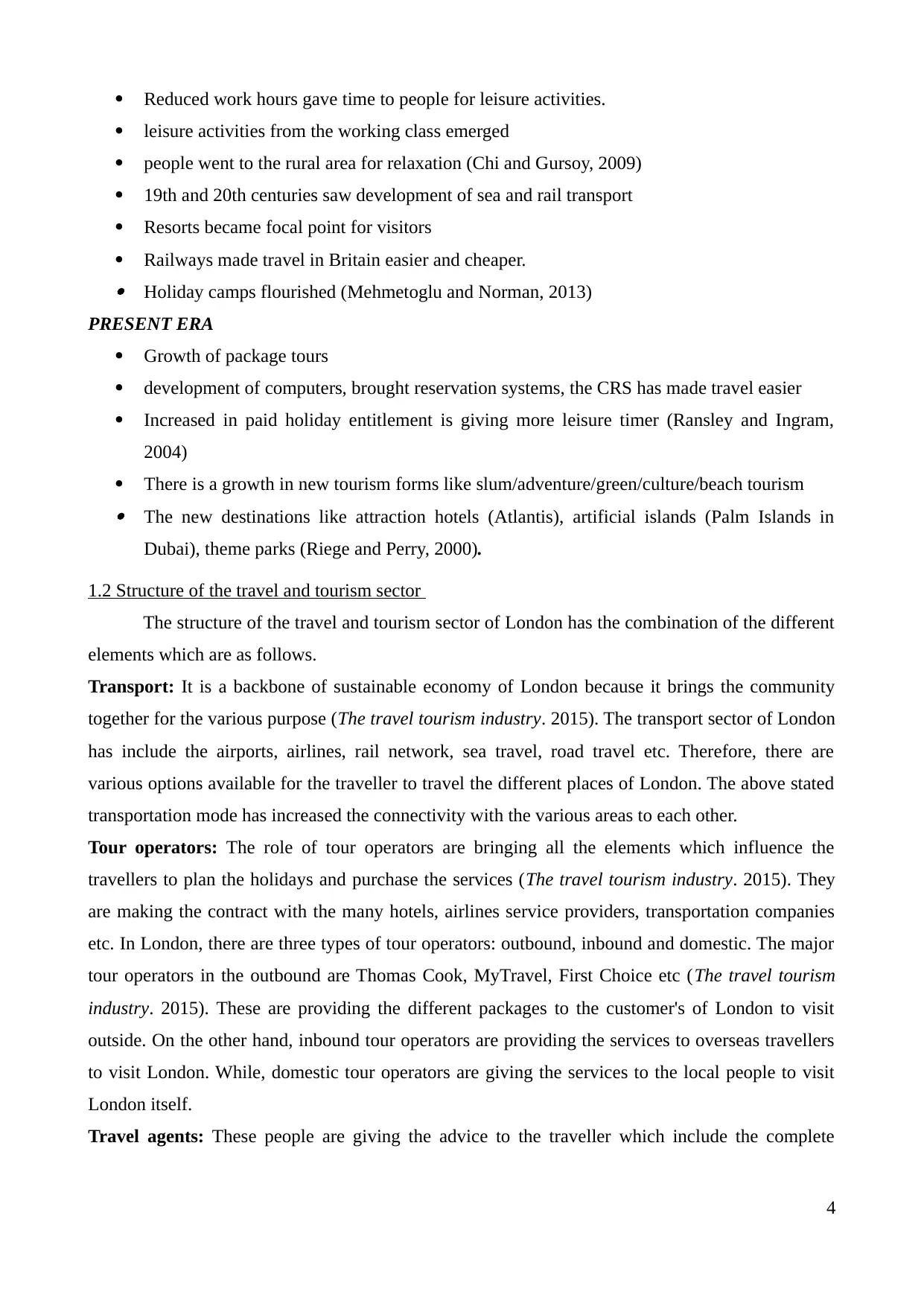
Reduced work hours gave time to people for leisure activities.
leisure activities from the working class emerged
people went to the rural area for relaxation (Chi and Gursoy, 2009)
19th and 20th centuries saw development of sea and rail transport
Resorts became focal point for visitors
Railways made travel in Britain easier and cheaper. Holiday camps flourished (Mehmetoglu and Norman, 2013)
PRESENT ERA
Growth of package tours
development of computers, brought reservation systems, the CRS has made travel easier
Increased in paid holiday entitlement is giving more leisure timer (Ransley and Ingram,
2004)
There is a growth in new tourism forms like slum/adventure/green/culture/beach tourism The new destinations like attraction hotels (Atlantis), artificial islands (Palm Islands in
Dubai), theme parks (Riege and Perry, 2000).
1.2 Structure of the travel and tourism sector
The structure of the travel and tourism sector of London has the combination of the different
elements which are as follows.
Transport: It is a backbone of sustainable economy of London because it brings the community
together for the various purpose (The travel tourism industry. 2015). The transport sector of London
has include the airports, airlines, rail network, sea travel, road travel etc. Therefore, there are
various options available for the traveller to travel the different places of London. The above stated
transportation mode has increased the connectivity with the various areas to each other.
Tour operators: The role of tour operators are bringing all the elements which influence the
travellers to plan the holidays and purchase the services (The travel tourism industry. 2015). They
are making the contract with the many hotels, airlines service providers, transportation companies
etc. In London, there are three types of tour operators: outbound, inbound and domestic. The major
tour operators in the outbound are Thomas Cook, MyTravel, First Choice etc (The travel tourism
industry. 2015). These are providing the different packages to the customer's of London to visit
outside. On the other hand, inbound tour operators are providing the services to overseas travellers
to visit London. While, domestic tour operators are giving the services to the local people to visit
London itself.
Travel agents: These people are giving the advice to the traveller which include the complete
4
leisure activities from the working class emerged
people went to the rural area for relaxation (Chi and Gursoy, 2009)
19th and 20th centuries saw development of sea and rail transport
Resorts became focal point for visitors
Railways made travel in Britain easier and cheaper. Holiday camps flourished (Mehmetoglu and Norman, 2013)
PRESENT ERA
Growth of package tours
development of computers, brought reservation systems, the CRS has made travel easier
Increased in paid holiday entitlement is giving more leisure timer (Ransley and Ingram,
2004)
There is a growth in new tourism forms like slum/adventure/green/culture/beach tourism The new destinations like attraction hotels (Atlantis), artificial islands (Palm Islands in
Dubai), theme parks (Riege and Perry, 2000).
1.2 Structure of the travel and tourism sector
The structure of the travel and tourism sector of London has the combination of the different
elements which are as follows.
Transport: It is a backbone of sustainable economy of London because it brings the community
together for the various purpose (The travel tourism industry. 2015). The transport sector of London
has include the airports, airlines, rail network, sea travel, road travel etc. Therefore, there are
various options available for the traveller to travel the different places of London. The above stated
transportation mode has increased the connectivity with the various areas to each other.
Tour operators: The role of tour operators are bringing all the elements which influence the
travellers to plan the holidays and purchase the services (The travel tourism industry. 2015). They
are making the contract with the many hotels, airlines service providers, transportation companies
etc. In London, there are three types of tour operators: outbound, inbound and domestic. The major
tour operators in the outbound are Thomas Cook, MyTravel, First Choice etc (The travel tourism
industry. 2015). These are providing the different packages to the customer's of London to visit
outside. On the other hand, inbound tour operators are providing the services to overseas travellers
to visit London. While, domestic tour operators are giving the services to the local people to visit
London itself.
Travel agents: These people are giving the advice to the traveller which include the complete
4
Paraphrase This Document
Need a fresh take? Get an instant paraphrase of this document with our AI Paraphraser
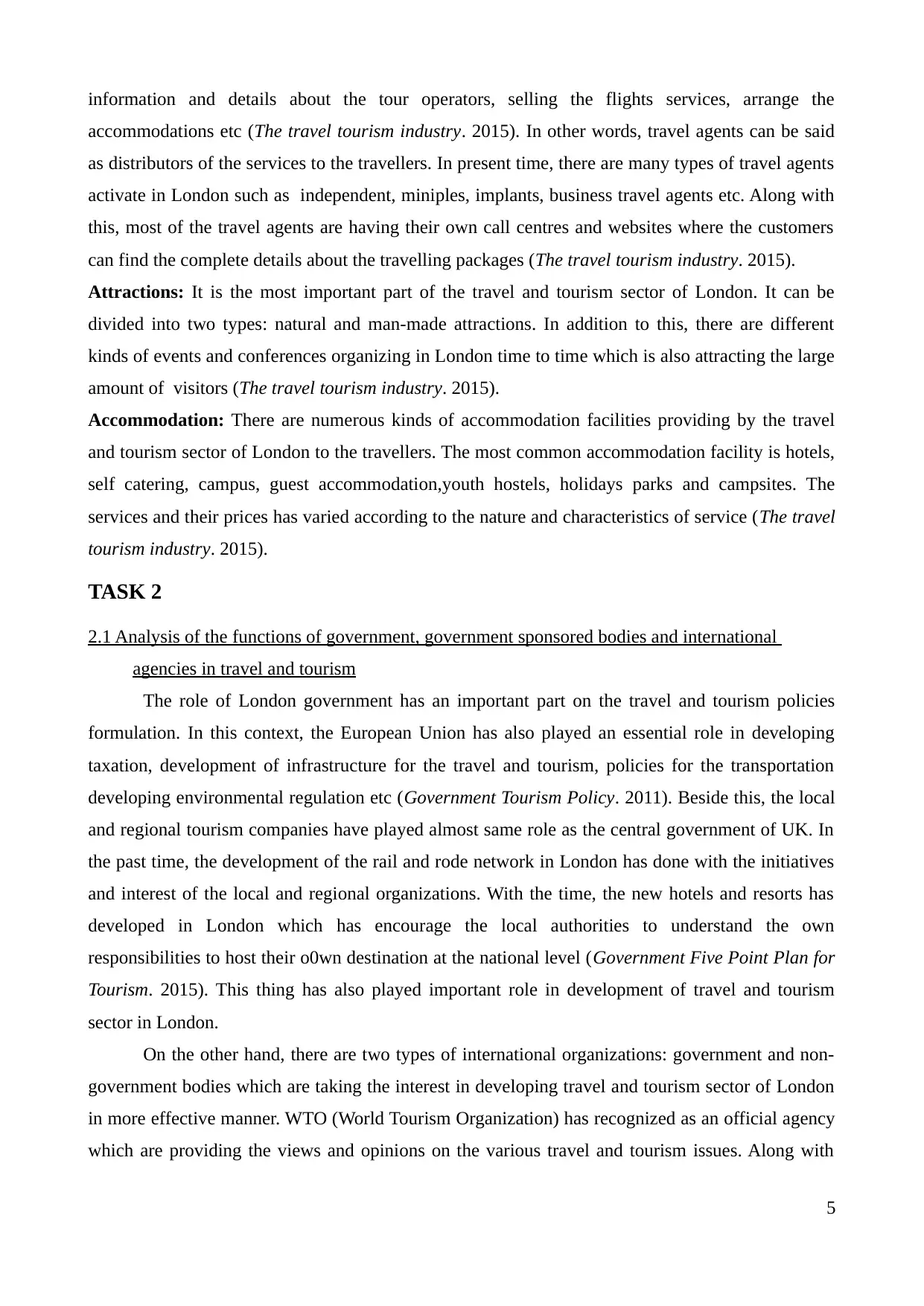
information and details about the tour operators, selling the flights services, arrange the
accommodations etc (The travel tourism industry. 2015). In other words, travel agents can be said
as distributors of the services to the travellers. In present time, there are many types of travel agents
activate in London such as independent, miniples, implants, business travel agents etc. Along with
this, most of the travel agents are having their own call centres and websites where the customers
can find the complete details about the travelling packages (The travel tourism industry. 2015).
Attractions: It is the most important part of the travel and tourism sector of London. It can be
divided into two types: natural and man-made attractions. In addition to this, there are different
kinds of events and conferences organizing in London time to time which is also attracting the large
amount of visitors (The travel tourism industry. 2015).
Accommodation: There are numerous kinds of accommodation facilities providing by the travel
and tourism sector of London to the travellers. The most common accommodation facility is hotels,
self catering, campus, guest accommodation,youth hostels, holidays parks and campsites. The
services and their prices has varied according to the nature and characteristics of service (The travel
tourism industry. 2015).
TASK 2
2.1 Analysis of the functions of government, government sponsored bodies and international
agencies in travel and tourism
The role of London government has an important part on the travel and tourism policies
formulation. In this context, the European Union has also played an essential role in developing
taxation, development of infrastructure for the travel and tourism, policies for the transportation
developing environmental regulation etc (Government Tourism Policy. 2011). Beside this, the local
and regional tourism companies have played almost same role as the central government of UK. In
the past time, the development of the rail and rode network in London has done with the initiatives
and interest of the local and regional organizations. With the time, the new hotels and resorts has
developed in London which has encourage the local authorities to understand the own
responsibilities to host their o0wn destination at the national level (Government Five Point Plan for
Tourism. 2015). This thing has also played important role in development of travel and tourism
sector in London.
On the other hand, there are two types of international organizations: government and non-
government bodies which are taking the interest in developing travel and tourism sector of London
in more effective manner. WTO (World Tourism Organization) has recognized as an official agency
which are providing the views and opinions on the various travel and tourism issues. Along with
5
accommodations etc (The travel tourism industry. 2015). In other words, travel agents can be said
as distributors of the services to the travellers. In present time, there are many types of travel agents
activate in London such as independent, miniples, implants, business travel agents etc. Along with
this, most of the travel agents are having their own call centres and websites where the customers
can find the complete details about the travelling packages (The travel tourism industry. 2015).
Attractions: It is the most important part of the travel and tourism sector of London. It can be
divided into two types: natural and man-made attractions. In addition to this, there are different
kinds of events and conferences organizing in London time to time which is also attracting the large
amount of visitors (The travel tourism industry. 2015).
Accommodation: There are numerous kinds of accommodation facilities providing by the travel
and tourism sector of London to the travellers. The most common accommodation facility is hotels,
self catering, campus, guest accommodation,youth hostels, holidays parks and campsites. The
services and their prices has varied according to the nature and characteristics of service (The travel
tourism industry. 2015).
TASK 2
2.1 Analysis of the functions of government, government sponsored bodies and international
agencies in travel and tourism
The role of London government has an important part on the travel and tourism policies
formulation. In this context, the European Union has also played an essential role in developing
taxation, development of infrastructure for the travel and tourism, policies for the transportation
developing environmental regulation etc (Government Tourism Policy. 2011). Beside this, the local
and regional tourism companies have played almost same role as the central government of UK. In
the past time, the development of the rail and rode network in London has done with the initiatives
and interest of the local and regional organizations. With the time, the new hotels and resorts has
developed in London which has encourage the local authorities to understand the own
responsibilities to host their o0wn destination at the national level (Government Five Point Plan for
Tourism. 2015). This thing has also played important role in development of travel and tourism
sector in London.
On the other hand, there are two types of international organizations: government and non-
government bodies which are taking the interest in developing travel and tourism sector of London
in more effective manner. WTO (World Tourism Organization) has recognized as an official agency
which are providing the views and opinions on the various travel and tourism issues. Along with
5
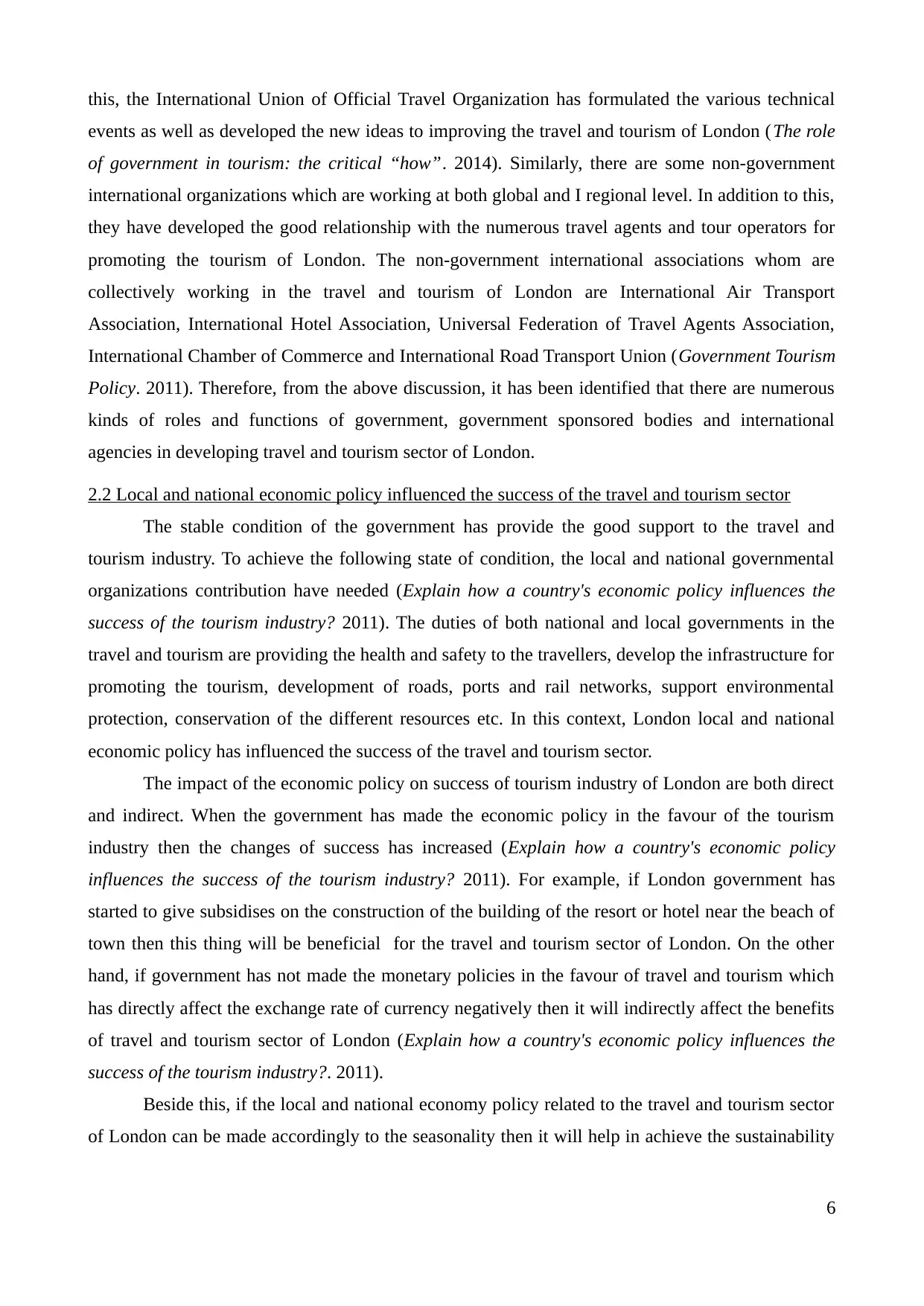
this, the International Union of Official Travel Organization has formulated the various technical
events as well as developed the new ideas to improving the travel and tourism of London (The role
of government in tourism: the critical “how”. 2014). Similarly, there are some non-government
international organizations which are working at both global and I regional level. In addition to this,
they have developed the good relationship with the numerous travel agents and tour operators for
promoting the tourism of London. The non-government international associations whom are
collectively working in the travel and tourism of London are International Air Transport
Association, International Hotel Association, Universal Federation of Travel Agents Association,
International Chamber of Commerce and International Road Transport Union (Government Tourism
Policy. 2011). Therefore, from the above discussion, it has been identified that there are numerous
kinds of roles and functions of government, government sponsored bodies and international
agencies in developing travel and tourism sector of London.
2.2 Local and national economic policy influenced the success of the travel and tourism sector
The stable condition of the government has provide the good support to the travel and
tourism industry. To achieve the following state of condition, the local and national governmental
organizations contribution have needed (Explain how a country's economic policy influences the
success of the tourism industry? 2011). The duties of both national and local governments in the
travel and tourism are providing the health and safety to the travellers, develop the infrastructure for
promoting the tourism, development of roads, ports and rail networks, support environmental
protection, conservation of the different resources etc. In this context, London local and national
economic policy has influenced the success of the travel and tourism sector.
The impact of the economic policy on success of tourism industry of London are both direct
and indirect. When the government has made the economic policy in the favour of the tourism
industry then the changes of success has increased (Explain how a country's economic policy
influences the success of the tourism industry? 2011). For example, if London government has
started to give subsidises on the construction of the building of the resort or hotel near the beach of
town then this thing will be beneficial for the travel and tourism sector of London. On the other
hand, if government has not made the monetary policies in the favour of travel and tourism which
has directly affect the exchange rate of currency negatively then it will indirectly affect the benefits
of travel and tourism sector of London (Explain how a country's economic policy influences the
success of the tourism industry?. 2011).
Beside this, if the local and national economy policy related to the travel and tourism sector
of London can be made accordingly to the seasonality then it will help in achieve the sustainability
6
events as well as developed the new ideas to improving the travel and tourism of London (The role
of government in tourism: the critical “how”. 2014). Similarly, there are some non-government
international organizations which are working at both global and I regional level. In addition to this,
they have developed the good relationship with the numerous travel agents and tour operators for
promoting the tourism of London. The non-government international associations whom are
collectively working in the travel and tourism of London are International Air Transport
Association, International Hotel Association, Universal Federation of Travel Agents Association,
International Chamber of Commerce and International Road Transport Union (Government Tourism
Policy. 2011). Therefore, from the above discussion, it has been identified that there are numerous
kinds of roles and functions of government, government sponsored bodies and international
agencies in developing travel and tourism sector of London.
2.2 Local and national economic policy influenced the success of the travel and tourism sector
The stable condition of the government has provide the good support to the travel and
tourism industry. To achieve the following state of condition, the local and national governmental
organizations contribution have needed (Explain how a country's economic policy influences the
success of the tourism industry? 2011). The duties of both national and local governments in the
travel and tourism are providing the health and safety to the travellers, develop the infrastructure for
promoting the tourism, development of roads, ports and rail networks, support environmental
protection, conservation of the different resources etc. In this context, London local and national
economic policy has influenced the success of the travel and tourism sector.
The impact of the economic policy on success of tourism industry of London are both direct
and indirect. When the government has made the economic policy in the favour of the tourism
industry then the changes of success has increased (Explain how a country's economic policy
influences the success of the tourism industry? 2011). For example, if London government has
started to give subsidises on the construction of the building of the resort or hotel near the beach of
town then this thing will be beneficial for the travel and tourism sector of London. On the other
hand, if government has not made the monetary policies in the favour of travel and tourism which
has directly affect the exchange rate of currency negatively then it will indirectly affect the benefits
of travel and tourism sector of London (Explain how a country's economic policy influences the
success of the tourism industry?. 2011).
Beside this, if the local and national economy policy related to the travel and tourism sector
of London can be made accordingly to the seasonality then it will help in achieve the sustainability
6
⊘ This is a preview!⊘
Do you want full access?
Subscribe today to unlock all pages.

Trusted by 1+ million students worldwide
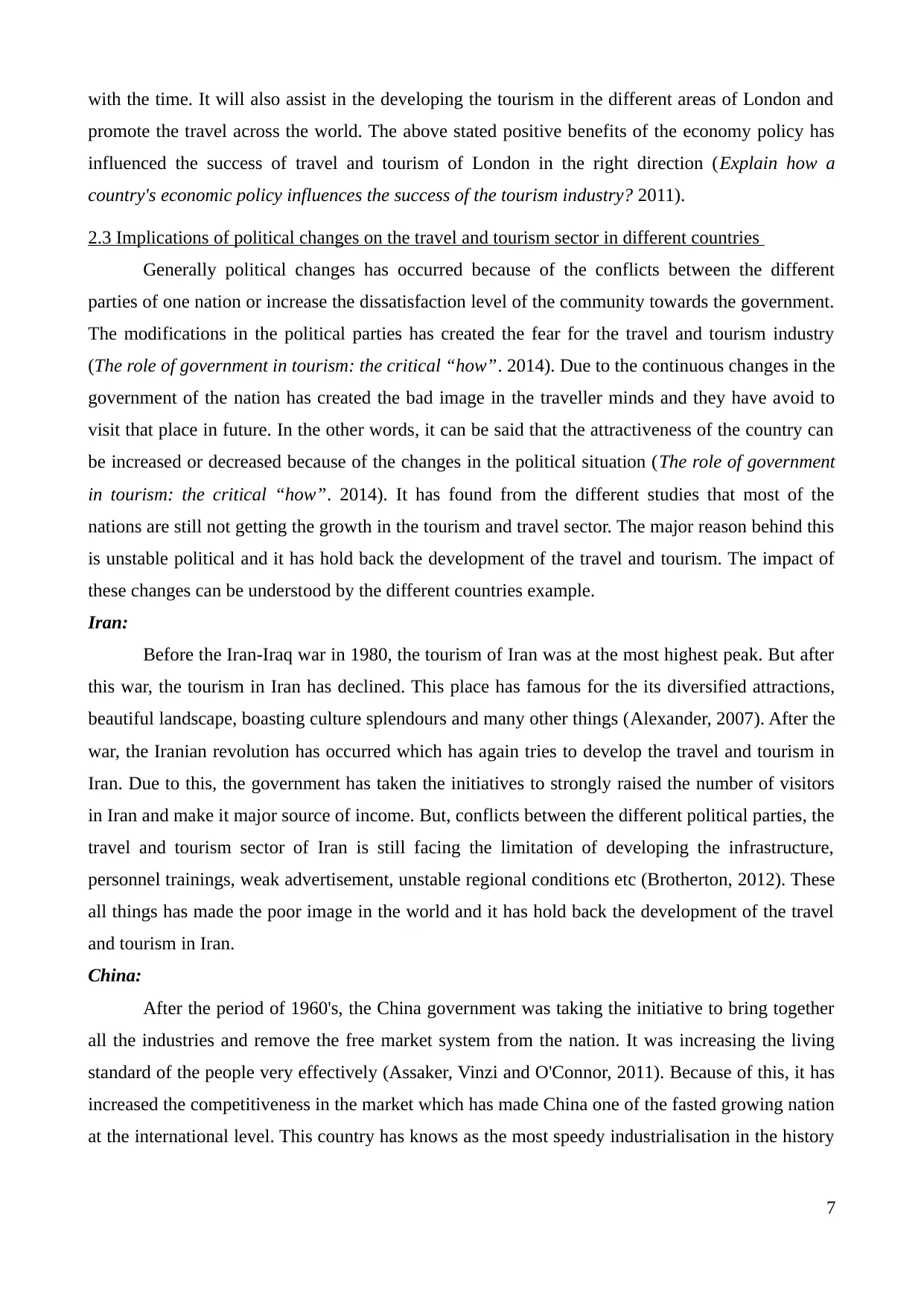
with the time. It will also assist in the developing the tourism in the different areas of London and
promote the travel across the world. The above stated positive benefits of the economy policy has
influenced the success of travel and tourism of London in the right direction (Explain how a
country's economic policy influences the success of the tourism industry? 2011).
2.3 Implications of political changes on the travel and tourism sector in different countries
Generally political changes has occurred because of the conflicts between the different
parties of one nation or increase the dissatisfaction level of the community towards the government.
The modifications in the political parties has created the fear for the travel and tourism industry
(The role of government in tourism: the critical “how”. 2014). Due to the continuous changes in the
government of the nation has created the bad image in the traveller minds and they have avoid to
visit that place in future. In the other words, it can be said that the attractiveness of the country can
be increased or decreased because of the changes in the political situation (The role of government
in tourism: the critical “how”. 2014). It has found from the different studies that most of the
nations are still not getting the growth in the tourism and travel sector. The major reason behind this
is unstable political and it has hold back the development of the travel and tourism. The impact of
these changes can be understood by the different countries example.
Iran:
Before the Iran-Iraq war in 1980, the tourism of Iran was at the most highest peak. But after
this war, the tourism in Iran has declined. This place has famous for the its diversified attractions,
beautiful landscape, boasting culture splendours and many other things (Alexander, 2007). After the
war, the Iranian revolution has occurred which has again tries to develop the travel and tourism in
Iran. Due to this, the government has taken the initiatives to strongly raised the number of visitors
in Iran and make it major source of income. But, conflicts between the different political parties, the
travel and tourism sector of Iran is still facing the limitation of developing the infrastructure,
personnel trainings, weak advertisement, unstable regional conditions etc (Brotherton, 2012). These
all things has made the poor image in the world and it has hold back the development of the travel
and tourism in Iran.
China:
After the period of 1960's, the China government was taking the initiative to bring together
all the industries and remove the free market system from the nation. It was increasing the living
standard of the people very effectively (Assaker, Vinzi and O'Connor, 2011). Because of this, it has
increased the competitiveness in the market which has made China one of the fasted growing nation
at the international level. This country has knows as the most speedy industrialisation in the history
7
promote the travel across the world. The above stated positive benefits of the economy policy has
influenced the success of travel and tourism of London in the right direction (Explain how a
country's economic policy influences the success of the tourism industry? 2011).
2.3 Implications of political changes on the travel and tourism sector in different countries
Generally political changes has occurred because of the conflicts between the different
parties of one nation or increase the dissatisfaction level of the community towards the government.
The modifications in the political parties has created the fear for the travel and tourism industry
(The role of government in tourism: the critical “how”. 2014). Due to the continuous changes in the
government of the nation has created the bad image in the traveller minds and they have avoid to
visit that place in future. In the other words, it can be said that the attractiveness of the country can
be increased or decreased because of the changes in the political situation (The role of government
in tourism: the critical “how”. 2014). It has found from the different studies that most of the
nations are still not getting the growth in the tourism and travel sector. The major reason behind this
is unstable political and it has hold back the development of the travel and tourism. The impact of
these changes can be understood by the different countries example.
Iran:
Before the Iran-Iraq war in 1980, the tourism of Iran was at the most highest peak. But after
this war, the tourism in Iran has declined. This place has famous for the its diversified attractions,
beautiful landscape, boasting culture splendours and many other things (Alexander, 2007). After the
war, the Iranian revolution has occurred which has again tries to develop the travel and tourism in
Iran. Due to this, the government has taken the initiatives to strongly raised the number of visitors
in Iran and make it major source of income. But, conflicts between the different political parties, the
travel and tourism sector of Iran is still facing the limitation of developing the infrastructure,
personnel trainings, weak advertisement, unstable regional conditions etc (Brotherton, 2012). These
all things has made the poor image in the world and it has hold back the development of the travel
and tourism in Iran.
China:
After the period of 1960's, the China government was taking the initiative to bring together
all the industries and remove the free market system from the nation. It was increasing the living
standard of the people very effectively (Assaker, Vinzi and O'Connor, 2011). Because of this, it has
increased the competitiveness in the market which has made China one of the fasted growing nation
at the international level. This country has knows as the most speedy industrialisation in the history
7
Paraphrase This Document
Need a fresh take? Get an instant paraphrase of this document with our AI Paraphraser
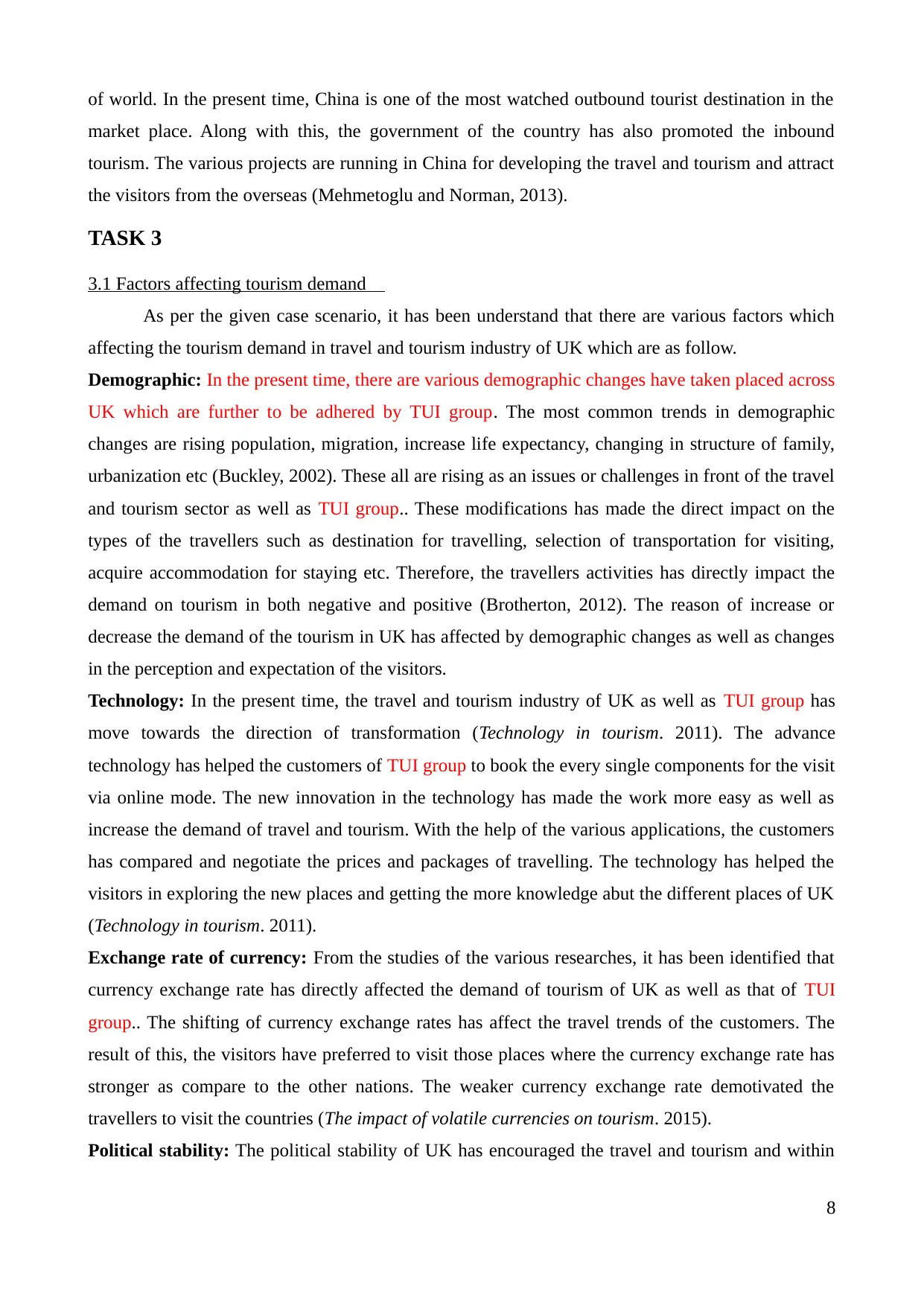
of world. In the present time, China is one of the most watched outbound tourist destination in the
market place. Along with this, the government of the country has also promoted the inbound
tourism. The various projects are running in China for developing the travel and tourism and attract
the visitors from the overseas (Mehmetoglu and Norman, 2013).
TASK 3
3.1 Factors affecting tourism demand
As per the given case scenario, it has been understand that there are various factors which
affecting the tourism demand in travel and tourism industry of UK which are as follow.
Demographic: In the present time, there are various demographic changes have taken placed across
UK which are further to be adhered by TUI group. The most common trends in demographic
changes are rising population, migration, increase life expectancy, changing in structure of family,
urbanization etc (Buckley, 2002). These all are rising as an issues or challenges in front of the travel
and tourism sector as well as TUI group.. These modifications has made the direct impact on the
types of the travellers such as destination for travelling, selection of transportation for visiting,
acquire accommodation for staying etc. Therefore, the travellers activities has directly impact the
demand on tourism in both negative and positive (Brotherton, 2012). The reason of increase or
decrease the demand of the tourism in UK has affected by demographic changes as well as changes
in the perception and expectation of the visitors.
Technology: In the present time, the travel and tourism industry of UK as well as TUI group has
move towards the direction of transformation (Technology in tourism. 2011). The advance
technology has helped the customers of TUI group to book the every single components for the visit
via online mode. The new innovation in the technology has made the work more easy as well as
increase the demand of travel and tourism. With the help of the various applications, the customers
has compared and negotiate the prices and packages of travelling. The technology has helped the
visitors in exploring the new places and getting the more knowledge abut the different places of UK
(Technology in tourism. 2011).
Exchange rate of currency: From the studies of the various researches, it has been identified that
currency exchange rate has directly affected the demand of tourism of UK as well as that of TUI
group.. The shifting of currency exchange rates has affect the travel trends of the customers. The
result of this, the visitors have preferred to visit those places where the currency exchange rate has
stronger as compare to the other nations. The weaker currency exchange rate demotivated the
travellers to visit the countries (The impact of volatile currencies on tourism. 2015).
Political stability: The political stability of UK has encouraged the travel and tourism and within
8
market place. Along with this, the government of the country has also promoted the inbound
tourism. The various projects are running in China for developing the travel and tourism and attract
the visitors from the overseas (Mehmetoglu and Norman, 2013).
TASK 3
3.1 Factors affecting tourism demand
As per the given case scenario, it has been understand that there are various factors which
affecting the tourism demand in travel and tourism industry of UK which are as follow.
Demographic: In the present time, there are various demographic changes have taken placed across
UK which are further to be adhered by TUI group. The most common trends in demographic
changes are rising population, migration, increase life expectancy, changing in structure of family,
urbanization etc (Buckley, 2002). These all are rising as an issues or challenges in front of the travel
and tourism sector as well as TUI group.. These modifications has made the direct impact on the
types of the travellers such as destination for travelling, selection of transportation for visiting,
acquire accommodation for staying etc. Therefore, the travellers activities has directly impact the
demand on tourism in both negative and positive (Brotherton, 2012). The reason of increase or
decrease the demand of the tourism in UK has affected by demographic changes as well as changes
in the perception and expectation of the visitors.
Technology: In the present time, the travel and tourism industry of UK as well as TUI group has
move towards the direction of transformation (Technology in tourism. 2011). The advance
technology has helped the customers of TUI group to book the every single components for the visit
via online mode. The new innovation in the technology has made the work more easy as well as
increase the demand of travel and tourism. With the help of the various applications, the customers
has compared and negotiate the prices and packages of travelling. The technology has helped the
visitors in exploring the new places and getting the more knowledge abut the different places of UK
(Technology in tourism. 2011).
Exchange rate of currency: From the studies of the various researches, it has been identified that
currency exchange rate has directly affected the demand of tourism of UK as well as that of TUI
group.. The shifting of currency exchange rates has affect the travel trends of the customers. The
result of this, the visitors have preferred to visit those places where the currency exchange rate has
stronger as compare to the other nations. The weaker currency exchange rate demotivated the
travellers to visit the countries (The impact of volatile currencies on tourism. 2015).
Political stability: The political stability of UK has encouraged the travel and tourism and within
8
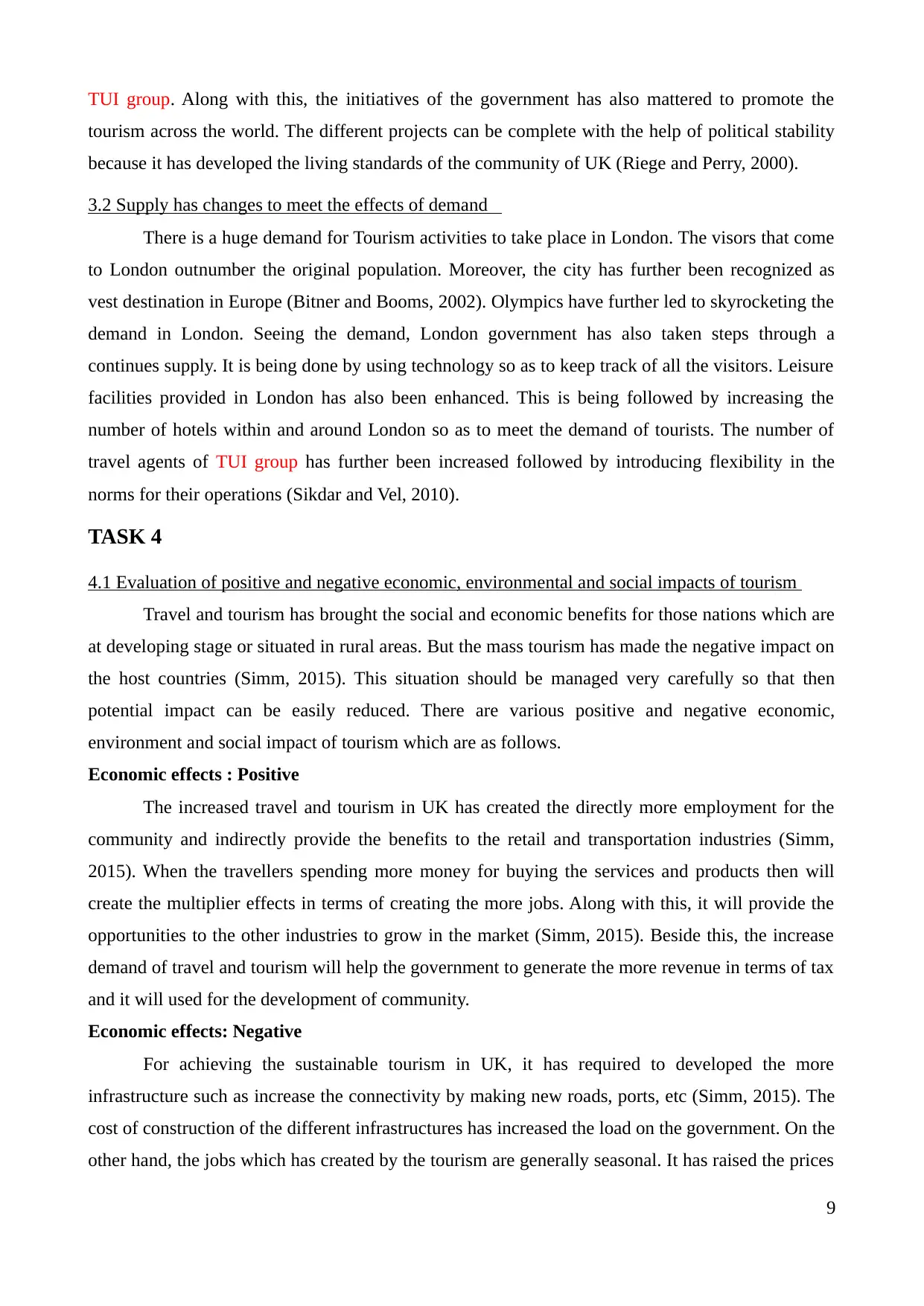
TUI group. Along with this, the initiatives of the government has also mattered to promote the
tourism across the world. The different projects can be complete with the help of political stability
because it has developed the living standards of the community of UK (Riege and Perry, 2000).
3.2 Supply has changes to meet the effects of demand
There is a huge demand for Tourism activities to take place in London. The visors that come
to London outnumber the original population. Moreover, the city has further been recognized as
vest destination in Europe (Bitner and Booms, 2002). Olympics have further led to skyrocketing the
demand in London. Seeing the demand, London government has also taken steps through a
continues supply. It is being done by using technology so as to keep track of all the visitors. Leisure
facilities provided in London has also been enhanced. This is being followed by increasing the
number of hotels within and around London so as to meet the demand of tourists. The number of
travel agents of TUI group has further been increased followed by introducing flexibility in the
norms for their operations (Sikdar and Vel, 2010).
TASK 4
4.1 Evaluation of positive and negative economic, environmental and social impacts of tourism
Travel and tourism has brought the social and economic benefits for those nations which are
at developing stage or situated in rural areas. But the mass tourism has made the negative impact on
the host countries (Simm, 2015). This situation should be managed very carefully so that then
potential impact can be easily reduced. There are various positive and negative economic,
environment and social impact of tourism which are as follows.
Economic effects : Positive
The increased travel and tourism in UK has created the directly more employment for the
community and indirectly provide the benefits to the retail and transportation industries (Simm,
2015). When the travellers spending more money for buying the services and products then will
create the multiplier effects in terms of creating the more jobs. Along with this, it will provide the
opportunities to the other industries to grow in the market (Simm, 2015). Beside this, the increase
demand of travel and tourism will help the government to generate the more revenue in terms of tax
and it will used for the development of community.
Economic effects: Negative
For achieving the sustainable tourism in UK, it has required to developed the more
infrastructure such as increase the connectivity by making new roads, ports, etc (Simm, 2015). The
cost of construction of the different infrastructures has increased the load on the government. On the
other hand, the jobs which has created by the tourism are generally seasonal. It has raised the prices
9
tourism across the world. The different projects can be complete with the help of political stability
because it has developed the living standards of the community of UK (Riege and Perry, 2000).
3.2 Supply has changes to meet the effects of demand
There is a huge demand for Tourism activities to take place in London. The visors that come
to London outnumber the original population. Moreover, the city has further been recognized as
vest destination in Europe (Bitner and Booms, 2002). Olympics have further led to skyrocketing the
demand in London. Seeing the demand, London government has also taken steps through a
continues supply. It is being done by using technology so as to keep track of all the visitors. Leisure
facilities provided in London has also been enhanced. This is being followed by increasing the
number of hotels within and around London so as to meet the demand of tourists. The number of
travel agents of TUI group has further been increased followed by introducing flexibility in the
norms for their operations (Sikdar and Vel, 2010).
TASK 4
4.1 Evaluation of positive and negative economic, environmental and social impacts of tourism
Travel and tourism has brought the social and economic benefits for those nations which are
at developing stage or situated in rural areas. But the mass tourism has made the negative impact on
the host countries (Simm, 2015). This situation should be managed very carefully so that then
potential impact can be easily reduced. There are various positive and negative economic,
environment and social impact of tourism which are as follows.
Economic effects : Positive
The increased travel and tourism in UK has created the directly more employment for the
community and indirectly provide the benefits to the retail and transportation industries (Simm,
2015). When the travellers spending more money for buying the services and products then will
create the multiplier effects in terms of creating the more jobs. Along with this, it will provide the
opportunities to the other industries to grow in the market (Simm, 2015). Beside this, the increase
demand of travel and tourism will help the government to generate the more revenue in terms of tax
and it will used for the development of community.
Economic effects: Negative
For achieving the sustainable tourism in UK, it has required to developed the more
infrastructure such as increase the connectivity by making new roads, ports, etc (Simm, 2015). The
cost of construction of the different infrastructures has increased the load on the government. On the
other hand, the jobs which has created by the tourism are generally seasonal. It has raised the prices
9
⊘ This is a preview!⊘
Do you want full access?
Subscribe today to unlock all pages.

Trusted by 1+ million students worldwide
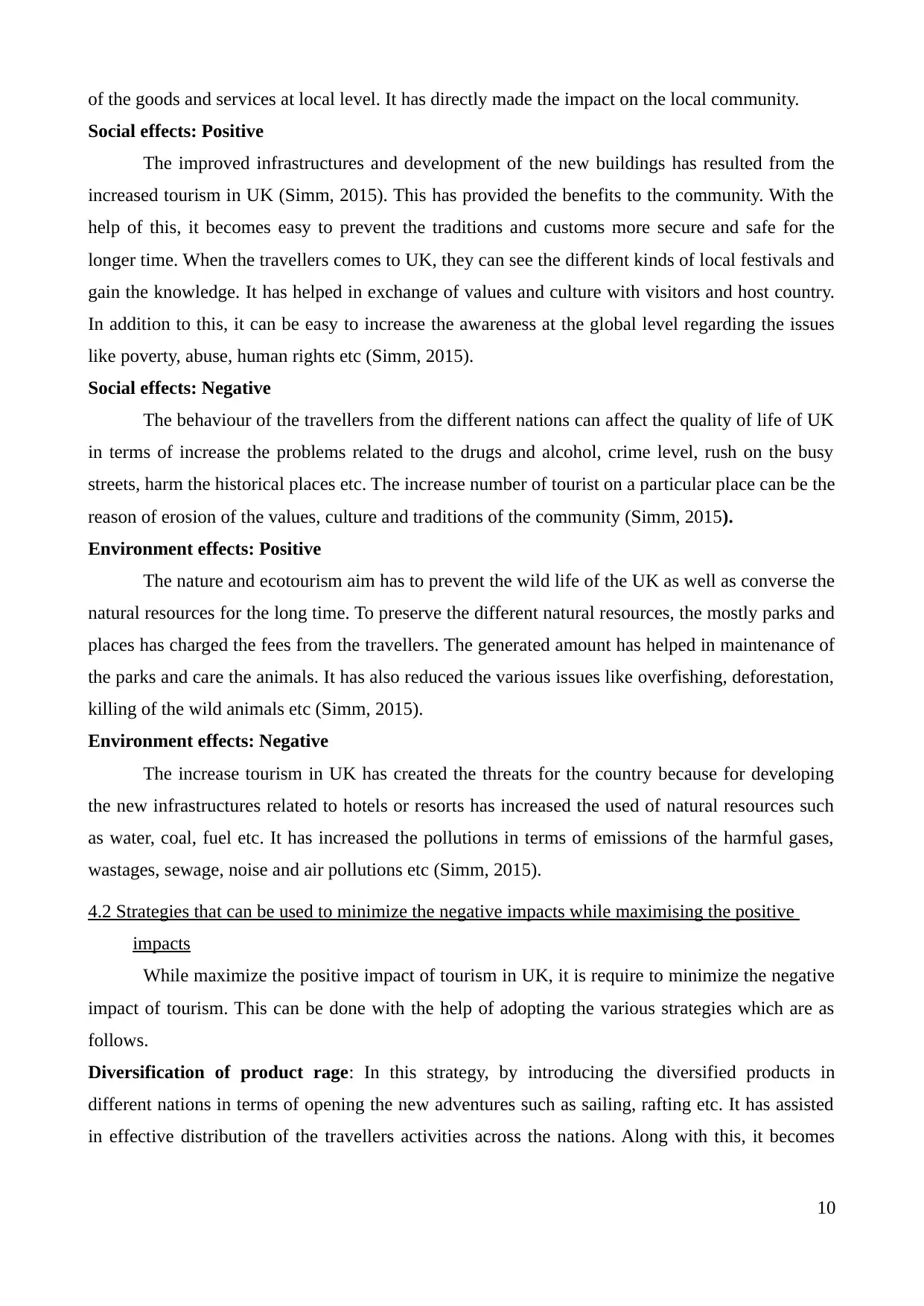
of the goods and services at local level. It has directly made the impact on the local community.
Social effects: Positive
The improved infrastructures and development of the new buildings has resulted from the
increased tourism in UK (Simm, 2015). This has provided the benefits to the community. With the
help of this, it becomes easy to prevent the traditions and customs more secure and safe for the
longer time. When the travellers comes to UK, they can see the different kinds of local festivals and
gain the knowledge. It has helped in exchange of values and culture with visitors and host country.
In addition to this, it can be easy to increase the awareness at the global level regarding the issues
like poverty, abuse, human rights etc (Simm, 2015).
Social effects: Negative
The behaviour of the travellers from the different nations can affect the quality of life of UK
in terms of increase the problems related to the drugs and alcohol, crime level, rush on the busy
streets, harm the historical places etc. The increase number of tourist on a particular place can be the
reason of erosion of the values, culture and traditions of the community (Simm, 2015).
Environment effects: Positive
The nature and ecotourism aim has to prevent the wild life of the UK as well as converse the
natural resources for the long time. To preserve the different natural resources, the mostly parks and
places has charged the fees from the travellers. The generated amount has helped in maintenance of
the parks and care the animals. It has also reduced the various issues like overfishing, deforestation,
killing of the wild animals etc (Simm, 2015).
Environment effects: Negative
The increase tourism in UK has created the threats for the country because for developing
the new infrastructures related to hotels or resorts has increased the used of natural resources such
as water, coal, fuel etc. It has increased the pollutions in terms of emissions of the harmful gases,
wastages, sewage, noise and air pollutions etc (Simm, 2015).
4.2 Strategies that can be used to minimize the negative impacts while maximising the positive
impacts
While maximize the positive impact of tourism in UK, it is require to minimize the negative
impact of tourism. This can be done with the help of adopting the various strategies which are as
follows.
Diversification of product rage: In this strategy, by introducing the diversified products in
different nations in terms of opening the new adventures such as sailing, rafting etc. It has assisted
in effective distribution of the travellers activities across the nations. Along with this, it becomes
10
Social effects: Positive
The improved infrastructures and development of the new buildings has resulted from the
increased tourism in UK (Simm, 2015). This has provided the benefits to the community. With the
help of this, it becomes easy to prevent the traditions and customs more secure and safe for the
longer time. When the travellers comes to UK, they can see the different kinds of local festivals and
gain the knowledge. It has helped in exchange of values and culture with visitors and host country.
In addition to this, it can be easy to increase the awareness at the global level regarding the issues
like poverty, abuse, human rights etc (Simm, 2015).
Social effects: Negative
The behaviour of the travellers from the different nations can affect the quality of life of UK
in terms of increase the problems related to the drugs and alcohol, crime level, rush on the busy
streets, harm the historical places etc. The increase number of tourist on a particular place can be the
reason of erosion of the values, culture and traditions of the community (Simm, 2015).
Environment effects: Positive
The nature and ecotourism aim has to prevent the wild life of the UK as well as converse the
natural resources for the long time. To preserve the different natural resources, the mostly parks and
places has charged the fees from the travellers. The generated amount has helped in maintenance of
the parks and care the animals. It has also reduced the various issues like overfishing, deforestation,
killing of the wild animals etc (Simm, 2015).
Environment effects: Negative
The increase tourism in UK has created the threats for the country because for developing
the new infrastructures related to hotels or resorts has increased the used of natural resources such
as water, coal, fuel etc. It has increased the pollutions in terms of emissions of the harmful gases,
wastages, sewage, noise and air pollutions etc (Simm, 2015).
4.2 Strategies that can be used to minimize the negative impacts while maximising the positive
impacts
While maximize the positive impact of tourism in UK, it is require to minimize the negative
impact of tourism. This can be done with the help of adopting the various strategies which are as
follows.
Diversification of product rage: In this strategy, by introducing the diversified products in
different nations in terms of opening the new adventures such as sailing, rafting etc. It has assisted
in effective distribution of the travellers activities across the nations. Along with this, it becomes
10
Paraphrase This Document
Need a fresh take? Get an instant paraphrase of this document with our AI Paraphraser
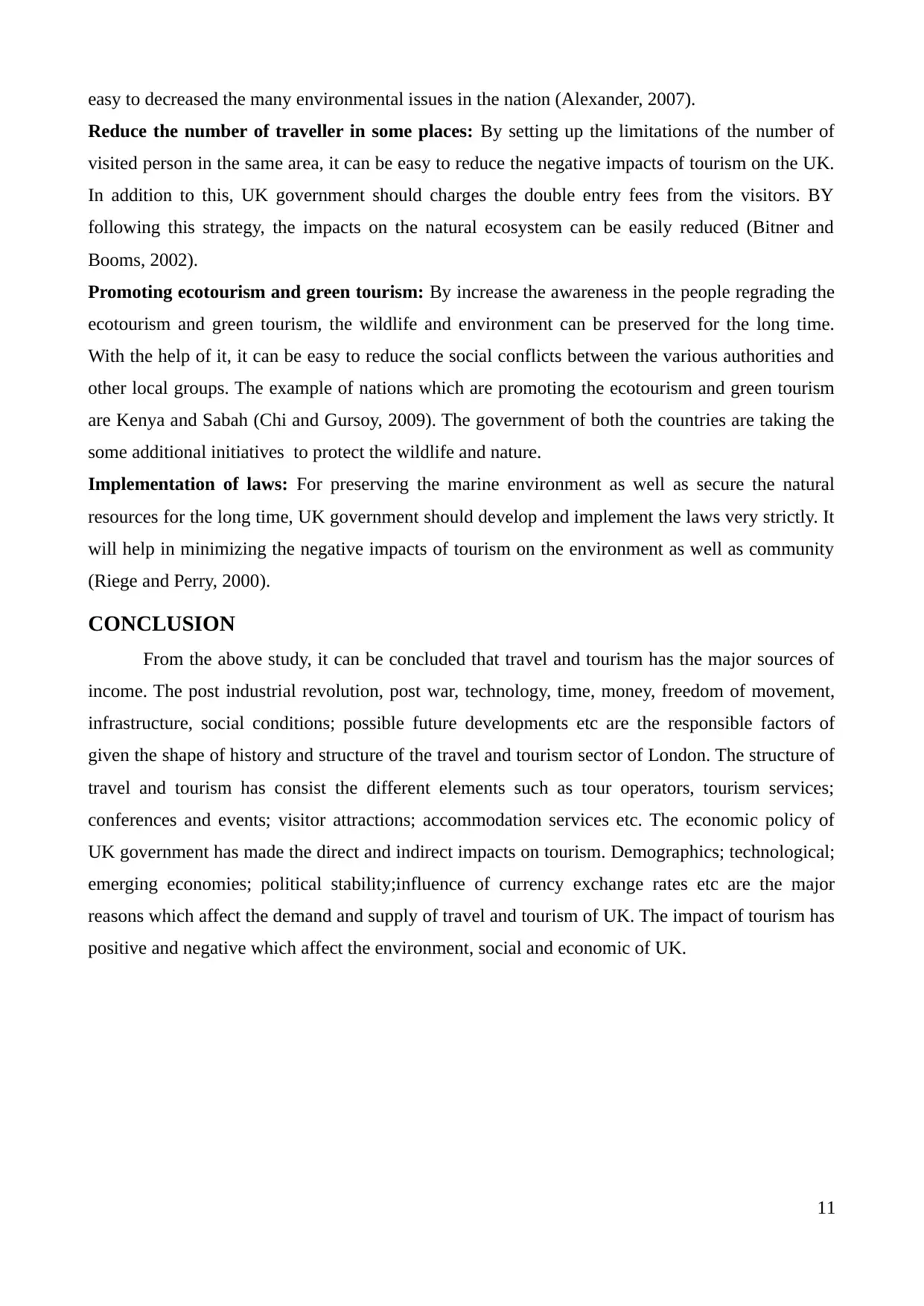
easy to decreased the many environmental issues in the nation (Alexander, 2007).
Reduce the number of traveller in some places: By setting up the limitations of the number of
visited person in the same area, it can be easy to reduce the negative impacts of tourism on the UK.
In addition to this, UK government should charges the double entry fees from the visitors. BY
following this strategy, the impacts on the natural ecosystem can be easily reduced (Bitner and
Booms, 2002).
Promoting ecotourism and green tourism: By increase the awareness in the people regrading the
ecotourism and green tourism, the wildlife and environment can be preserved for the long time.
With the help of it, it can be easy to reduce the social conflicts between the various authorities and
other local groups. The example of nations which are promoting the ecotourism and green tourism
are Kenya and Sabah (Chi and Gursoy, 2009). The government of both the countries are taking the
some additional initiatives to protect the wildlife and nature.
Implementation of laws: For preserving the marine environment as well as secure the natural
resources for the long time, UK government should develop and implement the laws very strictly. It
will help in minimizing the negative impacts of tourism on the environment as well as community
(Riege and Perry, 2000).
CONCLUSION
From the above study, it can be concluded that travel and tourism has the major sources of
income. The post industrial revolution, post war, technology, time, money, freedom of movement,
infrastructure, social conditions; possible future developments etc are the responsible factors of
given the shape of history and structure of the travel and tourism sector of London. The structure of
travel and tourism has consist the different elements such as tour operators, tourism services;
conferences and events; visitor attractions; accommodation services etc. The economic policy of
UK government has made the direct and indirect impacts on tourism. Demographics; technological;
emerging economies; political stability;influence of currency exchange rates etc are the major
reasons which affect the demand and supply of travel and tourism of UK. The impact of tourism has
positive and negative which affect the environment, social and economic of UK.
11
Reduce the number of traveller in some places: By setting up the limitations of the number of
visited person in the same area, it can be easy to reduce the negative impacts of tourism on the UK.
In addition to this, UK government should charges the double entry fees from the visitors. BY
following this strategy, the impacts on the natural ecosystem can be easily reduced (Bitner and
Booms, 2002).
Promoting ecotourism and green tourism: By increase the awareness in the people regrading the
ecotourism and green tourism, the wildlife and environment can be preserved for the long time.
With the help of it, it can be easy to reduce the social conflicts between the various authorities and
other local groups. The example of nations which are promoting the ecotourism and green tourism
are Kenya and Sabah (Chi and Gursoy, 2009). The government of both the countries are taking the
some additional initiatives to protect the wildlife and nature.
Implementation of laws: For preserving the marine environment as well as secure the natural
resources for the long time, UK government should develop and implement the laws very strictly. It
will help in minimizing the negative impacts of tourism on the environment as well as community
(Riege and Perry, 2000).
CONCLUSION
From the above study, it can be concluded that travel and tourism has the major sources of
income. The post industrial revolution, post war, technology, time, money, freedom of movement,
infrastructure, social conditions; possible future developments etc are the responsible factors of
given the shape of history and structure of the travel and tourism sector of London. The structure of
travel and tourism has consist the different elements such as tour operators, tourism services;
conferences and events; visitor attractions; accommodation services etc. The economic policy of
UK government has made the direct and indirect impacts on tourism. Demographics; technological;
emerging economies; political stability;influence of currency exchange rates etc are the major
reasons which affect the demand and supply of travel and tourism of UK. The impact of tourism has
positive and negative which affect the environment, social and economic of UK.
11
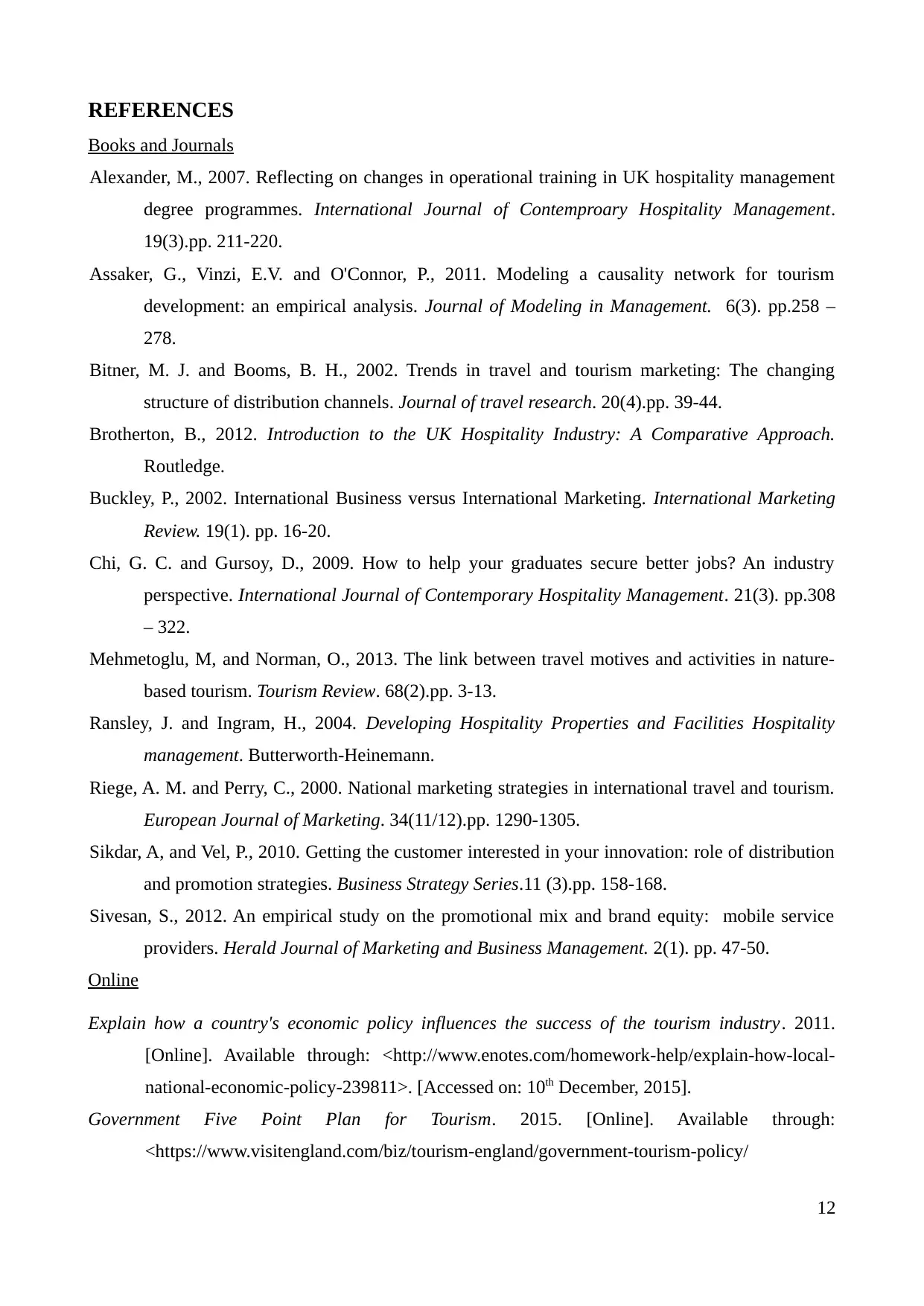
REFERENCES
Books and Journals
Alexander, M., 2007. Reflecting on changes in operational training in UK hospitality management
degree programmes. International Journal of Contemproary Hospitality Management.
19(3).pp. 211-220.
Assaker, G., Vinzi, E.V. and O'Connor, P., 2011. Modeling a causality network for tourism
development: an empirical analysis. Journal of Modeling in Management. 6(3). pp.258 –
278.
Bitner, M. J. and Booms, B. H., 2002. Trends in travel and tourism marketing: The changing
structure of distribution channels. Journal of travel research. 20(4).pp. 39-44.
Brotherton, B., 2012. Introduction to the UK Hospitality Industry: A Comparative Approach.
Routledge.
Buckley, P., 2002. International Business versus International Marketing. International Marketing
Review. 19(1). pp. 16-20.
Chi, G. C. and Gursoy, D., 2009. How to help your graduates secure better jobs? An industry
perspective. International Journal of Contemporary Hospitality Management. 21(3). pp.308
– 322.
Mehmetoglu, M, and Norman, O., 2013. The link between travel motives and activities in nature-
based tourism. Tourism Review. 68(2).pp. 3-13.
Ransley, J. and Ingram, H., 2004. Developing Hospitality Properties and Facilities Hospitality
management. Butterworth-Heinemann.
Riege, A. M. and Perry, C., 2000. National marketing strategies in international travel and tourism.
European Journal of Marketing. 34(11/12).pp. 1290-1305.
Sikdar, A, and Vel, P., 2010. Getting the customer interested in your innovation: role of distribution
and promotion strategies. Business Strategy Series.11 (3).pp. 158-168.
Sivesan, S., 2012. An empirical study on the promotional mix and brand equity: mobile service
providers. Herald Journal of Marketing and Business Management. 2(1). pp. 47-50.
Online
Explain how a country's economic policy influences the success of the tourism industry. 2011.
[Online]. Available through: <http://www.enotes.com/homework-help/explain-how-local-
national-economic-policy-239811>. [Accessed on: 10th December, 2015].
Government Five Point Plan for Tourism. 2015. [Online]. Available through:
<https://www.visitengland.com/biz/tourism-england/government-tourism-policy/
12
Books and Journals
Alexander, M., 2007. Reflecting on changes in operational training in UK hospitality management
degree programmes. International Journal of Contemproary Hospitality Management.
19(3).pp. 211-220.
Assaker, G., Vinzi, E.V. and O'Connor, P., 2011. Modeling a causality network for tourism
development: an empirical analysis. Journal of Modeling in Management. 6(3). pp.258 –
278.
Bitner, M. J. and Booms, B. H., 2002. Trends in travel and tourism marketing: The changing
structure of distribution channels. Journal of travel research. 20(4).pp. 39-44.
Brotherton, B., 2012. Introduction to the UK Hospitality Industry: A Comparative Approach.
Routledge.
Buckley, P., 2002. International Business versus International Marketing. International Marketing
Review. 19(1). pp. 16-20.
Chi, G. C. and Gursoy, D., 2009. How to help your graduates secure better jobs? An industry
perspective. International Journal of Contemporary Hospitality Management. 21(3). pp.308
– 322.
Mehmetoglu, M, and Norman, O., 2013. The link between travel motives and activities in nature-
based tourism. Tourism Review. 68(2).pp. 3-13.
Ransley, J. and Ingram, H., 2004. Developing Hospitality Properties and Facilities Hospitality
management. Butterworth-Heinemann.
Riege, A. M. and Perry, C., 2000. National marketing strategies in international travel and tourism.
European Journal of Marketing. 34(11/12).pp. 1290-1305.
Sikdar, A, and Vel, P., 2010. Getting the customer interested in your innovation: role of distribution
and promotion strategies. Business Strategy Series.11 (3).pp. 158-168.
Sivesan, S., 2012. An empirical study on the promotional mix and brand equity: mobile service
providers. Herald Journal of Marketing and Business Management. 2(1). pp. 47-50.
Online
Explain how a country's economic policy influences the success of the tourism industry. 2011.
[Online]. Available through: <http://www.enotes.com/homework-help/explain-how-local-
national-economic-policy-239811>. [Accessed on: 10th December, 2015].
Government Five Point Plan for Tourism. 2015. [Online]. Available through:
<https://www.visitengland.com/biz/tourism-england/government-tourism-policy/
12
⊘ This is a preview!⊘
Do you want full access?
Subscribe today to unlock all pages.

Trusted by 1+ million students worldwide
1 out of 13
Related Documents
Your All-in-One AI-Powered Toolkit for Academic Success.
+13062052269
info@desklib.com
Available 24*7 on WhatsApp / Email
![[object Object]](/_next/static/media/star-bottom.7253800d.svg)
Unlock your academic potential
Copyright © 2020–2026 A2Z Services. All Rights Reserved. Developed and managed by ZUCOL.





